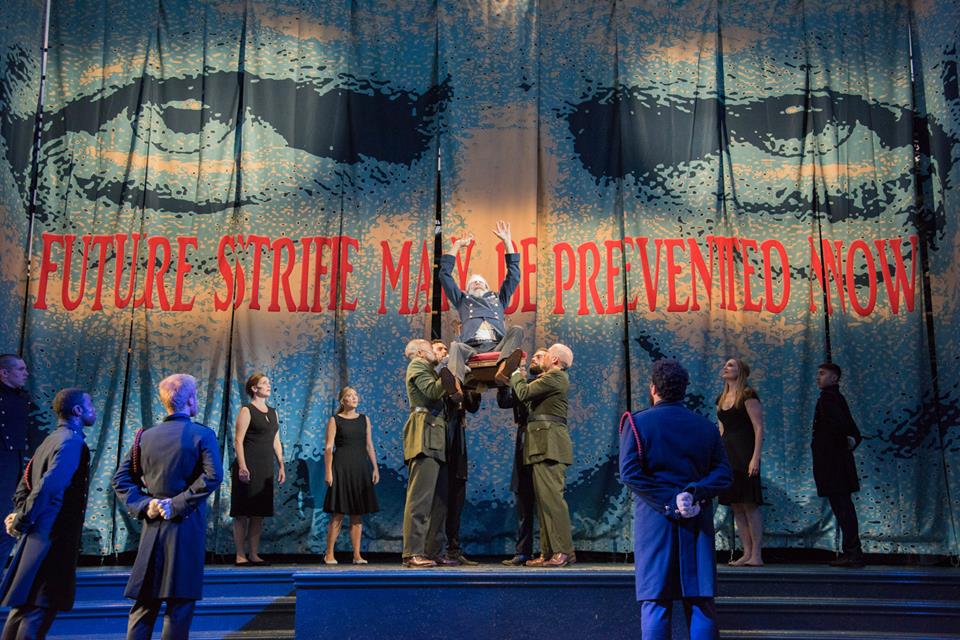
Photos by Andrew Brilliant/Brilliant Pictures
Presented by Commonwealth Shakespeare Company
By William Shakespeare
Directed by Steven Maler
July 22 – August 9, 2015
FREE and Open to the Public
Parkman Bandstand
Boston Common
Commonwealth Shakespeare Company on Facebook
ASL-Interpreted Performances: Friday, July 31 @ 8pm and Sunday, August 2 @ 7pm
Audio Described Performance: July 30 @ 8pm (Rain date: August 9 at 7pm)
Review by Danielle Rosvally
(Boston, MA) Before I even get into nitty gritties, let me take a moment to marvel at the fact that Commonwealth Shakespeare Company has brought free Shakespeare to the masses for almost two decades now. Nothing really says “summer” like Shakespeare al fresco, and Shakespeare on the Common is the way the arts should be: available, relatable, and welcoming. I was particularly excited this year to witness (for my first time) CSC’s ASL interpreted performance; and those interpreters were working just as hard as (if not harder than) the performers onstage. Shakespeare on the Common feels like a community coming together to support arts that include them; and that touches even my grinchy critic’s heart more than I can say.
This year’s production, King Lear, is definitely not a walk in the park. Lear is a notoriously tricky play that, much like an old jalopy, needs to be kicked just so in order to run properly. The monumental first scene of this play has everything the audience needs to know in it: all of the relationships are established, all of the exposition is given, and the “normalcy” of the world of the play is established. Hit that scene like a bullet train and a cast can ride the energy out to its ultimate fatal conclusion.
Unfortunately, this Lear starts not with a bang, but with a whimper. An odd ballet is tacked on to the beginning of the show that (I assume) is supposed to help the audience understand the Lear family relationships so they can follow the action of the opening scene. This ballet unfortunately took away from the power of the piece, and seemed to sap the actors’ energy so that they found themselves hard pressed to get it back. They did eventually, but it wasn’t until deep into Act Three that the characters truly blossomed. Unfortunately, by then it was too late; they were already deep into their character arcs and (generally) water boarded with tragedy; because I hadn’t grown attached to them before their misfortunes began, I was hard-pressed to care.
The true trouble seems to be one of direction. Steven Maler struggled to support his actors from within the text and seemed downright frightened of the Shakespearean language. A good text coach could have helped this piece truly shine from its first moment to its last.
The storm scene, I will admit, was spectacular to see. Live water effects coupled with fog, wind and sound bring the storm to life in a cinematic way that deepened the actors’ connection to the action (let me tell you how hard it is to act “wet” when you’re bone dry). Additionally, because of the natural course of an evening on the common, the scenery mimics the plot; as Lear descends deeper and deeper into darkness so too does the audience. This sense of lengthening shadows certainly added something to the fringes of Lear and draws the story home in a concrete way.
Despite a few follies on the part of the director, the cast is indubitably talented. Deb Martin literally towers over the “lesser men” as Goneril, and matches her stature with some acting chops. A last-minute casting change saw Jeanine Kane play a sturdy Regan whose sweet face was no match for her twisted innards. Libby McKnight’s Cordelia had a backbone of steel, which I’m not entirely certain served the story but definitely was an interesting choice. Unfortunately, a shrewish Cordelia pits the audience against the character in her dramatic first scene thus justifying Lear’s “madness” in exiling her and leaving us unenthused when she returns. As a result, the Lear/Cordelia relationship was a bit muddy and unclear. Mark W. Soucy and Maurice Emmanuel Parent as the Dukes of Albany and Cornwall respectively commanded the stage with power, passion, and a bit of bravado to boot. I would be remiss to wrap this review up before mentioning Will Lyman as Lear himself; a dynamic performance filled with pain, anguish, and a bit too much heat for one mind to bear. Lyman’s strength was proven long before his Act Five Cordelia pull-up, a feat any actor can be proud of.
If you’ve never seen King Lear before, this is a good opportunity to see a solid “starter” production. Don’t expect too many bells and whistles (…except for the storm, the storm is awesome), but this will give you an idea of what your high school English teacher kept going on about. And it’s not like you’re going to beat the ticket price either.
